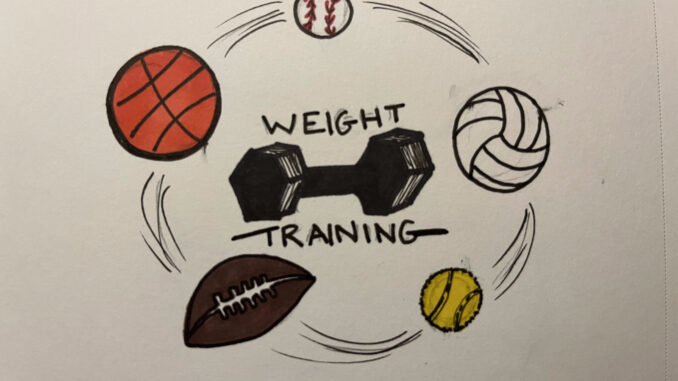
Lewis & Clark’s athletic teams require a multitude of conditioning and strength training programs individually tailored to each team. For this, these teams turn to Angela Dendas-Pleasant, the assistant athletic director and the head strength and conditioning coach. Dendas-Pleasant has her bachelor’s in kinesiology and her master’s in exercise science from Humboldt State, and has worked at LC for 11 years.
This role puts her as part of the administrative team, but she also oversees the strength and conditioning program for intercollegiate sports. Additionally, she teaches one weight training class per semester, twice a week.
“My primary responsibility is running our strength and conditioning program for our athletes, which entails overseeing 21 teams with 420+ athletes,” she said. “This entails everything from our weight room sessions to our sessions on the field or up in the gym for conditioning.”
Whenever the teams are not practicing with their sport-specific coaches, they are lifting or running with Dendas-Pleasant. She also oversees the scheduling side of operations, which extends to practices and competitions.
Dendas-Pleasant started her educational career believing she would go into sports medicine, but her path soon changed.
“I grew up around sports, so it was a natural fit to learn the science of it,” she said. “I went into sports medicine because that’s what I thought I wanted to do, and then I realized I didn’t, so when I went to grad school I went the exercise science route.”
In Fall 2013, Dendas-Pleasant was hired by LC to start the strength conditioning program. Since then, there has been significant growth in the department itself, as well as an improvement in the performance of the teams. As a Division-3 school, the rules are different than for the Division-1 and 2 schools, which established strength programs far before LC was able to. As soon as the regulations were changed, LC called in Dendas-Pleasant to start the new training program.
This year has been a great one so far for the teams on campus; football, for example, finished higher ranked in the conference than they have since 2011. Winter championships are still in progress, but results will be available soon.
“The challenging thing here is always going to be academic loads,” she said. “I’m big on working through our academic schedules, and I work really hard to make sure that the time an athlete is coming in works with their academic and practice schedule.”
As the head strength and conditioning coach, Dendas-Pleasant works in tandem with sports medicine through her prior experience in the field. She knows the “lingo” the therapists use, seeing herself as an “in-between” at times. She stressed the importance of the two programs being coordinated.
“We have licensed professionals that oversee our student athletes in terms of their health needs. An athletic program that provides strength and conditioning as well as sports medicine should be cohesive,” she said. “Injuries are inevitable, so it’s great having professionals that can work together to provide those services: to help an athlete get from when an injury happens to if surgery is needed, to get them back playing (in the appropriate time).”
Training routines are tailored to fit the specific needs of the team and sport; weight training will be tailored to how the coach wants the team to play as well as the athletes themselves want to play — and what they need to improve on.
“When you look at team sports, there’s not a huge difference between basketball (and) volleyball, for example. They’re similar, in terms of physiological demands, with variations, maybe, in the style of play a coach wants,” she said. “For the most part, sports that require an athlete to move quickly and jump high, you’re going to train those demands similarly.”
Dendas-Pleasant has been in this profession for 16 years, and the reason she enjoys it so much is for the deep bond both the athletes and her personal love for athletics.
“I got into it to have that connection to athletics. Being a former student athlete myself, it’s a big part of your identity,” Dendas-Pleasant said. “It was a way to learn how I can help athletes. Because you spend so much time with athletes, you can have a really huge impact on them.”
Her impact on the student athletes at this school is truly something special. She has helped grow the program from nothing to its current thriving state.
Subscribe to the Mossy Log Newsletter
Stay up to date with the goings-on at Lewis & Clark! Get the top stories or your favorite section delivered to your inbox whenever we release a new issue.

Leave a Reply